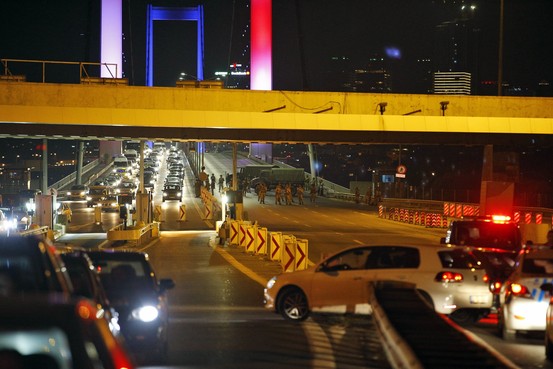Are Gülenists Really Behind Turkey’s Military Coup?
The night of July 15, 2016, a faction of the Turkish military took over Ankara and Istanbul, with fighter jets, tanks and bombs. In Istanbul, they blockaded both the Bosphorus and Fatih Sultan Mehmet bridges across the Bosphorus, which transects Istanbul into the European and Central Asian continents.
At Asymmetrica, we were not entirely surprised by the coup. We’ve been tracking the growing instability in Turkey for a couple of years. On May 2nd, we blogged about Turkey’s deep challenges and complex foreign relations, in our report on a briefing we attended at the UK Parliament’s House of Commons, hosted by Khalid Nadeem’s South Asia Middle East (SAME) Institute.
There are many reasons for the growing fracture and polarization.
Turkey is a country that has been in a state of undeclared war for some time. It has been fighting the PKK terrorist group, ISIS/Daesh pouring over the border, and a plethora of smuggling networks bringing in illicit consumer goods, people, weapons and suicide vests into Turkey. It has been racked by terrorist bombings a growing number of splinter groups over the past couple of years — not least, the Ataturk airport bombing on June 28th.
Turkey also has a low-level proxy war going with Russia, which is also a main trading partner, over the Syrian civil war, where they are backing opposing factions: Turkey is anti-Assad, while Russia is pro-Assad. But ISIS is fighting Assad and Turkey is anti-ISIS. Complicated.
A big part of the problem is that Turkey does not control its borders with Iraq and Syria; the Kurds do. While Turkey often makes public statements about fighting the Kurds, the reality is far more complex. It is questionable whether Turkey can do anything to prevent a strong Kurdish-dominated administration in north-east Syria short of a full-scale invasion that, in turn, risks confrontation with Syria and its Russian-Iranian-Hezbollah allies. Furthermore, while a growing number of Kurdish splinter groups represent a domestic terrorist threat, Turkey needs the Kurds to fight ISIS/Daesh: about 80% – 90% of the Iraqi forces fighting ISIS/Daesh are in fact Kurds.
Furthermore, Erdogan’s parallel centralization of power and his growing Islamization have angered significant portions of the military, who have seen themselves marginalized and are secular. Some of the marginalization of the most effective military has been fueled by Erdogan’s renowned paranoia. So many of his most effective military leaders have been pushed “outside the tent” — always a bad idea.
The Turkish military are powerful: they are the second-largest military in NATO. They also view themselves as defenders of the secularism that marked modern Turkey, since its founding by Mustafa Kemal Atatürk, Turkey’s first president, who was was a revolutionary army officer. So the military’s historical narrative justifying this coup attempt is not hard to trace.
In the middle of the coup, Erdogan broadcast to state TV networks using FaceTime on his phone; it is never a good sign when the President cannot get to a TV station. The coup was timed for when he was on holiday in Bodrum. Rumors that Erdogan had fled the country for Europe were later countered by his landing in Istanbul.

Erdogan broadcasts by FaceTime.
While broadcasting from his phone (after having quashed social media platforms), Erdogan blamed the “Gülenist parallel state.” The Gülenists are a different Muslim faction that present themselves as mild and moderate — though not everyone sees them that way. They have dozens of academies and colleges all over the United States and in Europe. Their leader Fethullan Gülen lives in a compound in Pennsylvania; Erdogan (a former ally of Gülen’s) has long petitioned for Gülen’s extradition for trial in Turkey, but the US government has denied his requests.
It is far too early to tell whether it really is the Gülenists, or whether Erdogan is saving face by blaming his second-favorite bête noire after the Kurds. But the left-leaning BBC was certainly having a field day with it, calling Fethullah Gülen’s continued US residency “an embarassment to the United States.”
Although Fethullah Gülen himself swiftly denied any involvement, it is true that there are many in the Turkish military and governing power structure that were educated in his system and have significant loyalty to his ideology and view his persecution by a more radically Muslim and dictatorial Erdogan as unjust.
At Asymmetrica we have been watching as other powers, antithetical to the US, have been attempting to exert power over the Gülenists, using them as a proxy to remove an Erdogan they don’t want. It will be interesting to watch in the coming weeks where responsibility is assigned and whether those shadowy outside influencers rear their heads above the parapet.
Stay tuned.
![]()



